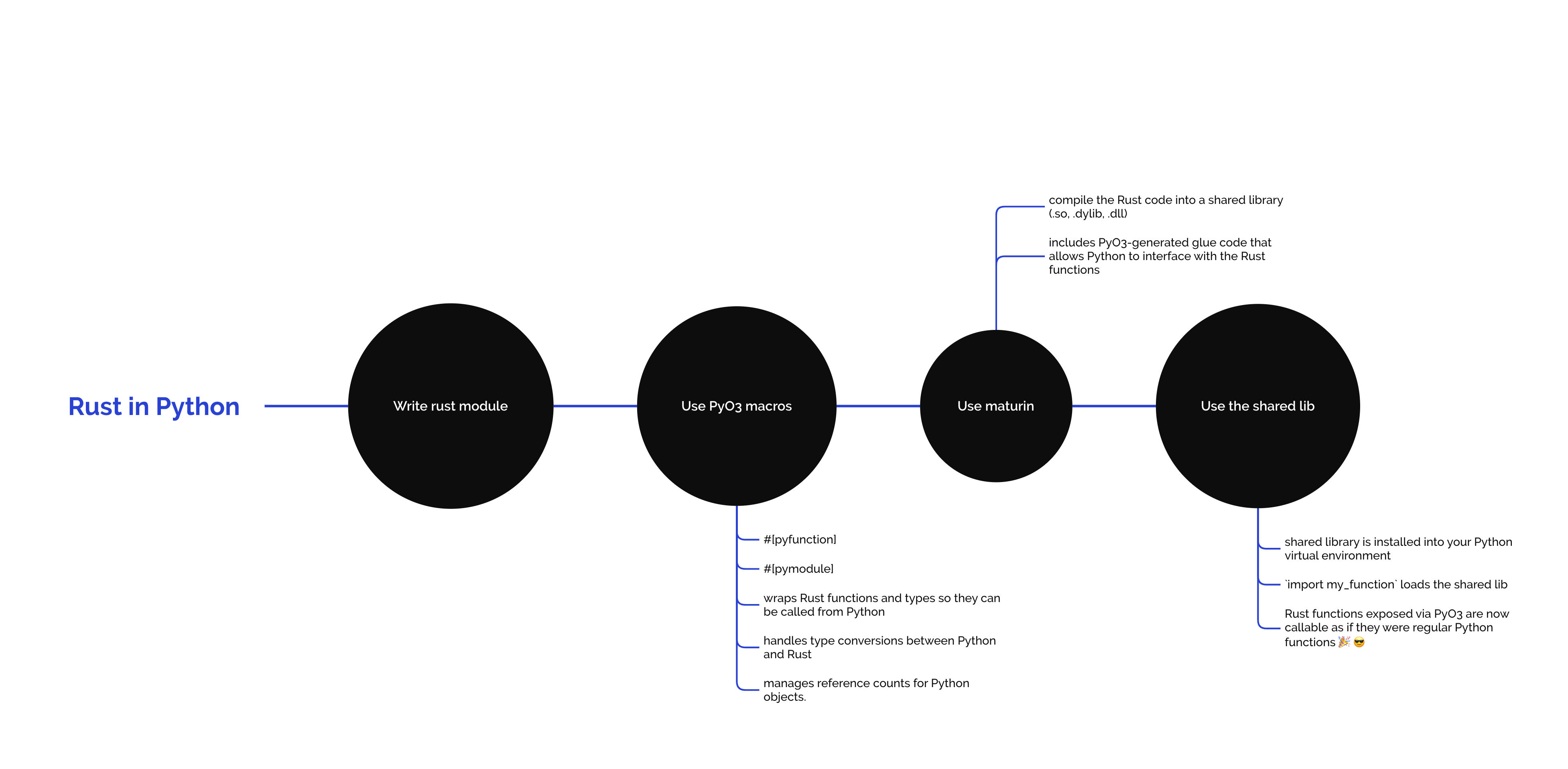How to run Rust in Python with PyO3 and Maturin
In this article I will show you how to run Rust code in Python using PyO3 + Maturin.
PyO3 is a Rust library for building Python bindings and Maturin is a tool for building and publishing Python packages built with PyO3.
Here is a quick overview of the steps we will follow:

Let's do a quick demo to see how it works.
Create a new library
First, let's create a new Rust library using Cargo:
cargo new --lib sum_squares
This will create a new directory called sum_squares with the following structure:
√ pyo3 $ tree
.
└── sum_squares
├── Cargo.toml
└── src
└── lib.rs
3 directories, 2 files
Next we update the Cargo.toml file to include the pyo3 dependency:
[package]
name = "sum_squares"
version = "0.1.0"
edition = "2021"
[lib]
name = "sum_squares"
crate-type = ["cdylib"]
[dependencies]
pyo3 = { version = "0.21", features = ["extension-module"] }
We also need the cdylib crate type to create a shared library that can be loaded by Python (so/.dylib/.dll files, .so for Unix, .dll for Windows).
Next, we update the src/lib.rs file to include a simple function that sums the squares of two numbers:
use pyo3::prelude::*;
#[pyfunction]
fn sum_of_squares(n: u64) -> u64 {
(1..=n).map(|x| x * x).sum()
}
#[pymodule]
fn sum_squares(_py: Python, m: &PyModule) -> PyResult<()> {
m.add_function(wrap_pyfunction!(sum_of_squares, m)?)?;
Ok(())
}
At a high level:
- The
#[pyfunction]attribute is used to mark the function as a Python function. - The
#[pymodule]attribute is used to mark the module as a Python module. - The
m.add_functionmethod is used to add thesum_of_squaresfunction to the module. - The
wrap_pyfunction!macro is used to wrap the Rust function in a Python function. - The
PythonandPyModuletypes are used to interact with the Python runtime.
Some Rust syntax I am learning about:
- We use the
usestatement to import thepyo3::preludemodule, which contains common types and traits used in PyO3. - The
sum_of_squaresfunction calculates the sum of squares of numbers from 1 tonusing the..=operator (=is including the upper bound) to create a range and themapandsummethods to calculate the sum of squares, - The function receives a single argument
nof typeu64and returns a single value of typeu64. Unlike Python's optional type hints, Rust's type hints are mandatory. - The
PyResultin thesum_squaresfunction signature is the return type of functions that can return errors. This is needed because theadd_functionmethod can return an error. The?operator is used to propagate the error if it occurs. - The
Ok(())expression is used to return a successful result. () is the unit type, which is similar to void in other languages.
Create a Python package
First make a virtual environment, enable it, and install the maturin package:
python -m venv venv
source venv/bin/activate
pip install maturin
Normally you would run maturin init to create a new Python package, but in this case we already have a Cargo project, so we can skip this step.
Let's build the Python package using Maturin:
maturin develop
It worked but I did get this warning:
warning: use of deprecated method `pyo3::deprecations::GilRefs::<T>::function_arg`: use `&Bound<'_, T>` instead for this function argument
To fix this error, I updated the function signature to use &Bound<'_, PyModule> instead of &PyModule:
...
fn sum_squares(m: &Bound<'_, PyModule>) -> PyResult<()> {
...
After that change, I ran maturin develop again and the warning was gone:
$ maturin develop
🔗 Found pyo3 bindings
🐍 Found CPython 3.11 at /Users/bbelderbos/code/rust/pyo3/sum_squares/venv/bin/python
Finished `dev` profile [unoptimized + debuginfo] target(s) in 0.07s
📦 Built wheel for CPython 3.11 to /var/folders/jl/cfhvw0nj11n1496hk7vqhw_r0000gn/T/.tmp5qSsw8/sum_squares-0.1.0-cp311-cp311-macosx_10_12_x86_64.whl
✏️ Setting installed package as editable
🛠 Installed sum_squares-0.1.0
I can now see the shared library (.so file) in my virtual environment:
$ ls -lrth venv/lib/python3.11/site-packages/sum_squares
total 1936
-rw-r--r--@ 1 bbelderbos staff 127B Jun 4 12:59 __init__.py
-rwxr-xr-x@ 1 bbelderbos staff 961K Jun 4 12:59 sum_squares.cpython-311-darwin.so
drwxr-xr-x@ 3 bbelderbos staff 96B Jun 4 12:59 __pycache__
And I can import it in the Python REPL:
>>> import sum_squares
>>> sum_squares.sum_of_squares(5)
55
That's it! We have successfully built a Python package with Rust code using PyO3 and Maturin.
I have not pushed one to PyPI, but you can do that by running maturin publish. I will blog here when I have done that for a real project ...
Lastly, to see how it performs vs some Python code, I created a test.py file:
import time
from sum_squares import sum_of_squares
def sum_of_squares_py(n):
return sum(x * x for x in range(1, n + 1))
if __name__ == "__main__":
n = 10**6
start_time = time.time()
result = sum_of_squares_py(n)
end_time = time.time()
print(f"Python result: {result}")
print(f"Python execution time: {end_time - start_time:.6f} seconds")
start_time = time.time()
result = sum_of_squares(n)
end_time = time.time()
print(f"Rust result: {result}")
print(f"Rust execution time: {end_time - start_time:.6f} seconds")
Running it:
$ python test.py
Python result: 333333833333500000
Python execution time: 0.066308 seconds
Rust result: 333333833333500000
Rust execution time: 0.023685 seconds
Nice, the Rust implementation is about 3x faster than the Python implementation. But that's not the point of this article, the point is to show you how to run Rust code in Python which opens up exciting new opportunities for performance improvements in your Python code. 😍 📈
This is how Pydantic, the data validation library, is speeding up its codebase I believe. 😎
Conclusion
In this article, we learned how to run Rust code in Python using PyO3 and Maturin. We created a new Rust library with a simple function that sums the squares of two numbers, built a Python package using Maturin, and tested the performance of the Rust implementation against a Python implementation.
There is a lot more to learn about PyO3 and Maturin, and Rust in general.
Check out the PyO3 documentation and the Maturin documentation for more information.
What Python code do you want to speed up with Rust?